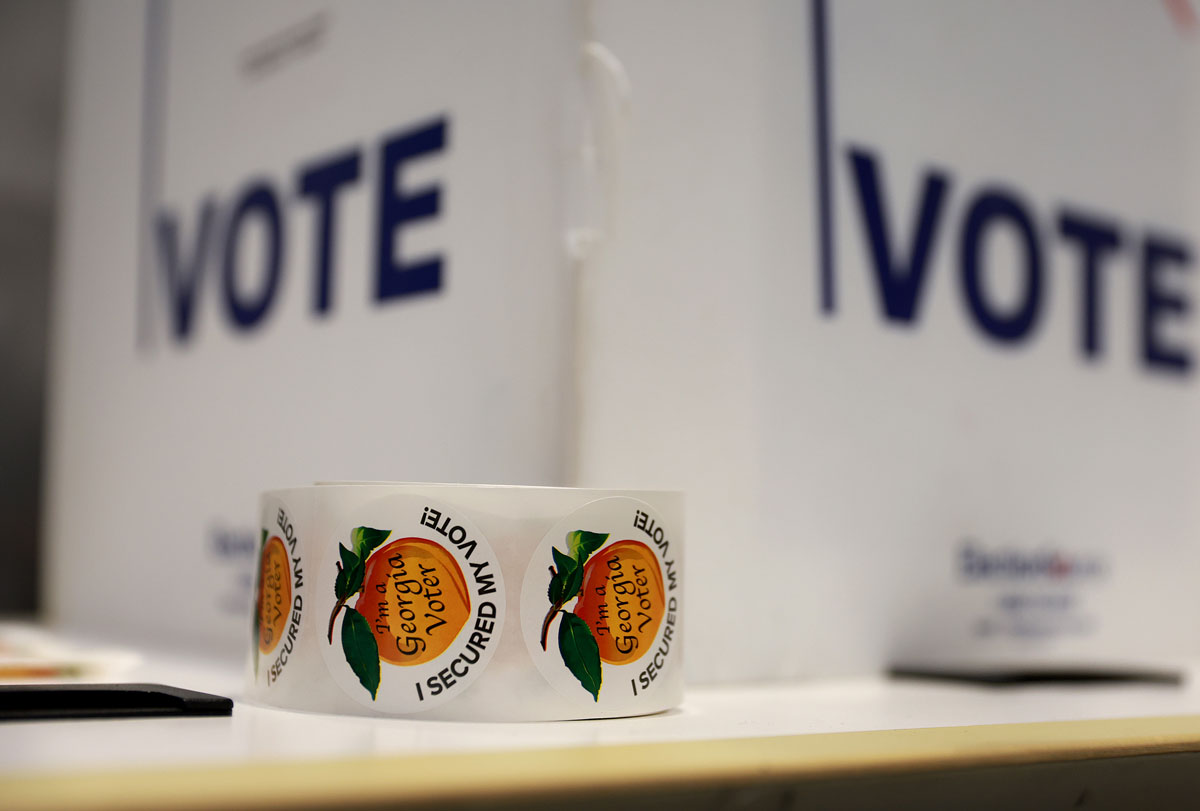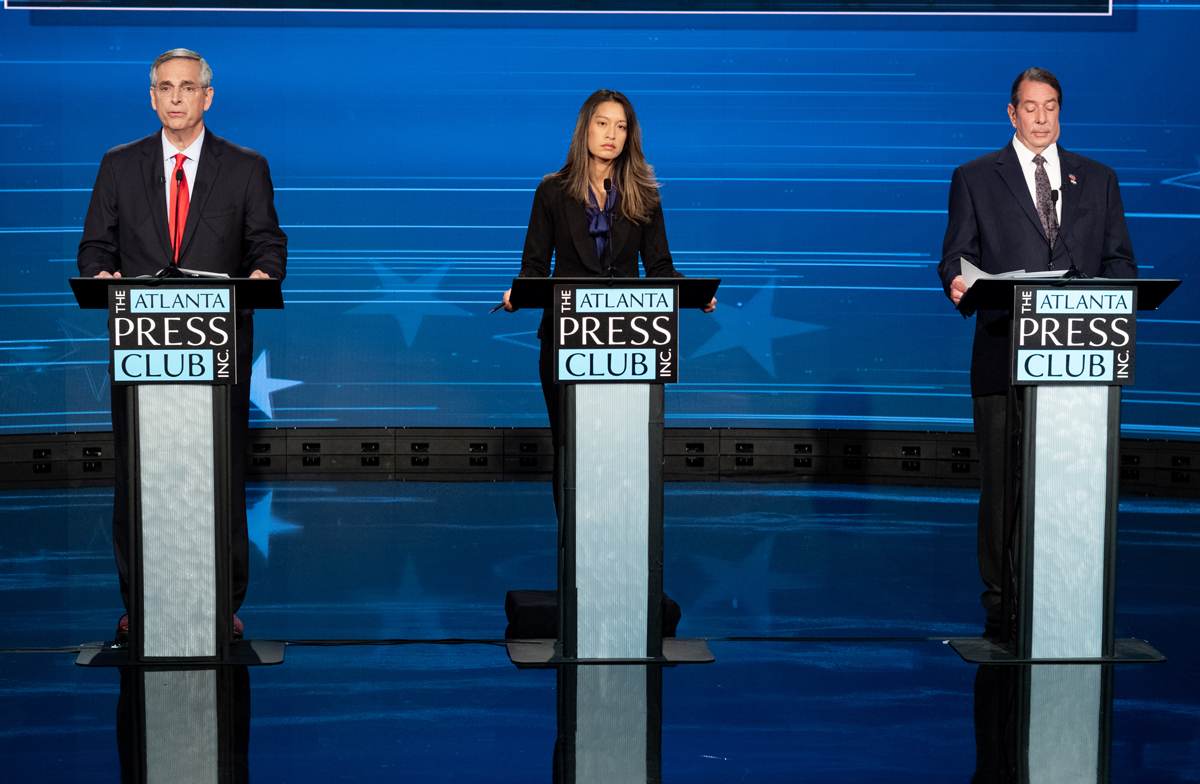
Photograph by Joe Raedle/Getty Images
Even if you’re not a Georgia politics junkie, you probably grasp the basics of top-ticket races like governor and senator on the ballot this November.
But what about those races further down the line, like State School Superintendent and Commissioner of Agriculture? They may not get the same level of airtime as the big-ticket races, but these offices are vitally important, and the elected officials who win them influence the lives of millions of Georgians.
Check out this guide to Georgia’s down-ballot races: the office, what it does and doesn’t do, and why it matters for you and your neighbors.
FYI: Some of these races only pertain to certain districts or counties: to see who’s on your ballot, head to the Secretary of State’s My Voter Page.

Photograph by REUTERS/Dustin Chambers/Pool
Lieutenant Governor
The job: The lieutenant governor is the executive branch’s second-ranking officer and serves as president of the state senate. Georgia is one of 17 states where the lieutenant governor is elected independently of the governor—not as the governor’s running mate—so the seats are occasionally held by members of different parties. That last happened in 2002, when Republican Sonny Perdue won the governorship, and Democrat Mark Taylor won reelection as lieutenant governor.
What they do: If the governor dies or steps down during office, the lieutenant governor takes over for the duration of the term. And as president of the state senate, the lieutenant governor presides over the daily legislative process, and has the power to cast the tie-breaking vote.
What they don’t do: Beyond their tie-breaking role, the lieutenant governor doesn’t control much else in the state legislature. The job held more power in the past, including naming committee chairs, but in 2003, Republicans—disgruntled with that Democratic lieutenant governor Mark Taylor—took away most of those duties and gave them to the senate pro tempore.
Why it matters: It may not be the most powerful position in government, but the lieutenant governor holds plenty of influence in Georgia. During the 2022 legislative session, for instance, Lieutenant Governor Geoff Duncan used his senate authority to tank the Buckhead City movement. Plus, the job is often a stepstone to higher office, so your vote in this race could matter even more down the line.

Photograph by Ben Gray/AP
Secretary of State
The job: The secretary of state is Georgia’s highest administrative officer. They manage business licensing and regulation, steward the state’s public records, and addresses civil claims filed against the state. Most importantly, they oversee the state’s elections—a role that put Georgia’s Secretary of State in the national spotlight after the 2020 election.
What they do: As Georgia’s chief elections official, the secretary of state manages all elements of the elections process, including voter registration, campaign finance disclosure, candidate qualification, and certifying election results. They also maintain voter registration rolls by removing people who have died or moved out of state, a controversial process voting rights advocates have criticized for its “use-it-or-lose-it” provision, which flags and then removes inactive voters. Some candidates for secretary of state want this process changed.
What they don’t do: The secretary of state doesn’t write election laws—that’s the state legislature’s job. And, as Secretary of State Brad Raffensperger made clear in that infamous 2021 phone call with then-President Trump, they can’t overturn election results.
Why it matters: The secretary of state has broad authority over how elections run, as well as how—or whether—they get certified. Incumbent Raffensperger and his Democratic opponent Bee Nguyen both say the 2020 election was fairly decided. But election deniers are running for Secretary of State in 13 other states, a worrisome trend that experts say could have dangerous consequences for future elections.
And while Georgia’s secretary of state doesn’t write election laws, they often consult with the legislators who do, which means your vote here can influence voting laws for years to come.

Photograph by Reuters/Dustin Chambers/Pool
Attorney General
The job: The attorney general is basically the state’s lawyer: they head the Department of Law, serve as chief legal counsel for the governor, and represent the state in court. Georgia’s Attorney General must be a licensed lawyer and an active member of the State Bar of Georgia.
What they do: The AG (or a member of their legal staff) represents Georgia in lawsuits filed against any state law or state agency, as well as in death penalty appeals and proceedings in front of the U.S. Supreme Court. They provide legal counsel to the governor, lieutenant governor, and other state officials, and they investigate corruption or other illegal activity within state agencies or private companies that do business with the state.
What they don’t do: The AG can decide not to defend a state law, if they believe it violates the state or federal constitution. But they don’t write or pass those laws, and they can’t sue the state to change the law.
Why it matters: The attorney general’s race this year has pivoted on enforcement of Georgia’s new abortion law. Challenger Jen Jordan believes the six-week ban violates the state constitution and has vowed not to defend it in courts. Incumbent Chris Carr insists that it is constitutional, and a member of his team is currently defending it in court.
Commissioner of Agriculture
The job: The commissioner manages the Georgia Department of Agriculture, which regulates and promotes the goods produced by Georgia farms and agrobusinesses. Agriculture is Georgia’s top-ranked industry, making this a pivotal state office.
What they do: Commissioner of agriculture oversees a wide array of agricultural industries, including grocery and convenience stores, pet breeders and dealers, fertilizer production, nurseries and garden centers, and food processing plants and warehouses. The commissioner also markets Georgia’s produce across the country and internationally.
What they don’t do: Commissioners of agriculture typically have farming backgrounds (both leading candidates this year are from multigenerational farming families) but this job doesn’t involve any plowing—it’s more of a desk job. And while the commissioner lobbies for or against agriculture legislation, they don’t draft laws.
Why it matters: The commissioner’s priority-setting for the agriculture industry has big impacts for the rest of the state. In the 2022 race, Republican Tyler Harper is running as a business-friendly candidate and has defended legislation that he calls pro-farmer, but critics say frustrates efforts to regulate farm waste runoff and soil contamination. Democrat Nakita Hemingway is campaigning on ending child hunger, promoting “shop local food” initiatives, and legalizing cannabis.
Commissioner of Insurance
The job: Insurance commissioner leads the Office of Insurance and Safety Fire Commissioner. The commissioner oversees all insurance companies operating in the state and investigates all fraud claims.
What they do: The insurance commissioner regulates policy rates for health, homeowner, life, auto, and other insurance. They investigate any consumer complaints related to insurance and issue consumer alerts. The commissioner is also the state’s chief fire marshal: they lead fire safety inspections and regulate fire safety in Georgia buildings.
What they don’t do: Due to a 2008 law, insurance commissioners can’t approve auto insurance rates before they take effect. Both leading candidates for the job support repeal of that law, which has sent auto insurance rates soaring in Georgia.
Why it matters: With the power to negotiate and regulate insurance rates, the commissioner of insurance has a big impact on Georgians’ wallets. Candidates also differ on big questions around health insurance: Democrat Janice Laws Robinson supports expansion of Medicaid, the federal health insurance for low-income people. That puts her at odds with incumbent John King, a Republican who took office in 2019 when then-Commissioner Jim Beck was charged with fraud.
State School Superintendent
The job: Georgia’s state school superintendent is in charge of all of Georgia’s public schools, from pre-K to 12th grade.
What they do: The state school superintendent leads the Georgia Department of Education. They institute the policies established by the Board of Education, and lead operations for the pre-K through 12 school system.
What they don’t do: The superintendent doesn’t write education policy, but they do make policy recommendations to the Board of Education, which is part of their mandate, written in state law, to improve the “welfare and efficiency” of Georgia’s public schools.
Why it matters: Post-pandemic, Georgia’s public-school teachers are struggling with burnout and retention rates, while students are still catching up from learning loss. Plus, school safety and the teaching of so-called “divisive concepts” have polarized voters and politicians alike. With broad authority over public school administration and influence over the Board of Education, the state school superintendent has big impacts on Georgia’s 1.2 million schoolchildren and 115,000 teachers.
Georgia Commissioner of Labor
The job: The state’s labor commissioner is responsible for Georgia’s labor market, overseeing both employment and unemployment.
What they do: The labor commissioner enforces the state’s labor regulations, manages unemployment insurance and programs to get people back to work, and reports on Georgia’s labor market.
What they don’t do: Increase their own department budget, which was slashed in half this year. Budget cuts have compounded the state Labor Department’s struggles, which buckled under the tidal wave of unemployment claims during the Covid-19 pandemic. To increase funding and hire more staff, as candidate William Boddie has called for, the commissioner of labor would have to lobby the state legislature.
Why it matters: As the Labor Department’s chaotic performance during the pandemic made clear, Georgia’s unemployment assistance and back-to-work programs need a serious overhaul. The leading candidates for commissioner have divergent ideas on how to solve it, so whoever wins will have a significant impact on Georgia’s unemployment policy in the term to come.
County Commissioner/Board of Commissioners (voter district-specific)
The Job: As stipulated by Georgia law, each of the state’s counties (except the consolidated city-counties) is governed by a board of commissioners or a sole commissioner. Check your sample ballot to see if there’s a commissioner’s race in your county.
What they do: Members of the county commission manage county property, finances, personnel, and rules and regulations. They can levy taxes for county revenue and are responsible for local road and bridge repair. In most counties, the Board of Commissioners is comprised of both district and at-large commissioners, who debate and vote on governing matters; in eight Georgia counties, a sole commissioner leads the county.
What they don’t do: Pass county legislation that contradicts state or federal law. Through “home rule” authority, county commissioners can adopt “clearly reasonable” ordinances and regulations, but they must comply with the constitution and higher levels of government.
Why it matters: Frustrated with trash pickup, potholes, or a raccoon menacing your backyard? Those are all issues your county commissioners can help with. When it comes to day-to-day life, local politics is often where your vote has the biggest impact.
County Soil & Water Conservation District Supervisor
The job: After the 1930s Dust Bowl decimated Georgia’s soil, the General Assembly created 40 conservation districts, covering the entire state, which are tasked with conserving the state’s soil, water, and other natural resources. There are at least two supervisors per district overseeing the work of the conservation district, but some seats are appointed by the state commission, not elected.
What they do: District supervisors work closely with the state-wide conservation commission and the USDA-Natural Resources Conservation Service, to set local priorities for resource conservation and protection. They work with farmers, landowners, and others in their district to educate and promote programs for conservation in their area.
What they don’t do: Get paid. This is an unpaid, nonpartisan seat, which is why many districts have vacancies (check out the list—maybe you’d like to run!). They don’t levy taxes or have enforcement powers.
Why it matters: Though the conservation districts lack enforcement powers, they’re still an important advocate for conservation of Georgia’s natural resources.
County Solicitor General
The job: The solicitor general is a county-level prosecutor who handles lower-level misdemeanor crimes.
What they do: Georgia has several different judicial circuits, which prosecute different kinds of crimes depending on the seriousness of the crime, the laws that were broken, and who was victimized. The county solicitor general, along with their assistant solicitors general, prosecutes misdemeanor crimes in state court. Misdemeanors are lower-level crimes like traffic violations, disorderly conduct, and possession of small amounts of cannabis, and are punishable by less than a year of prison time.
What they don’t do: The county solicitor general doesn’t prosecute felonies: more serious crimes like murder and aggravated assault are prosecuted by the district attorney, a different elected position that represents several counties within a district. And federal crimes, like money laundering or human trafficking, go straight to the U.S. attorney.
Why it matters: County solicitors general have fairly wide discretion when prosecuting misdemeanors and can choose to refer defendants to alternative sentencing programs, which reduce prison time or keep information off the criminal record. That means your vote for solicitor general impacts how the criminal justice system works in your county.













